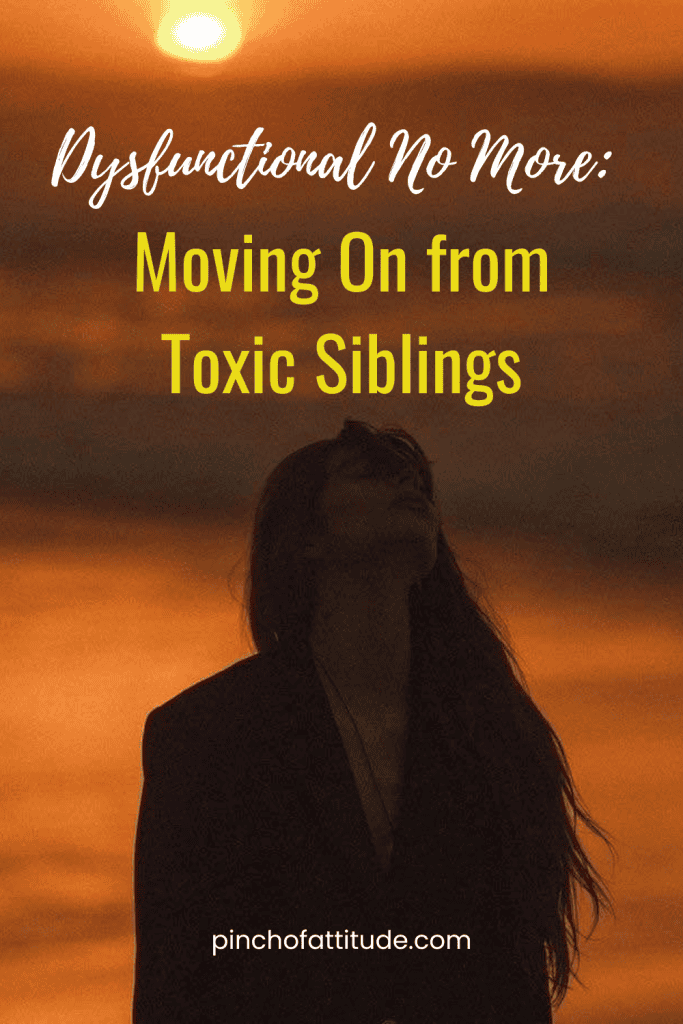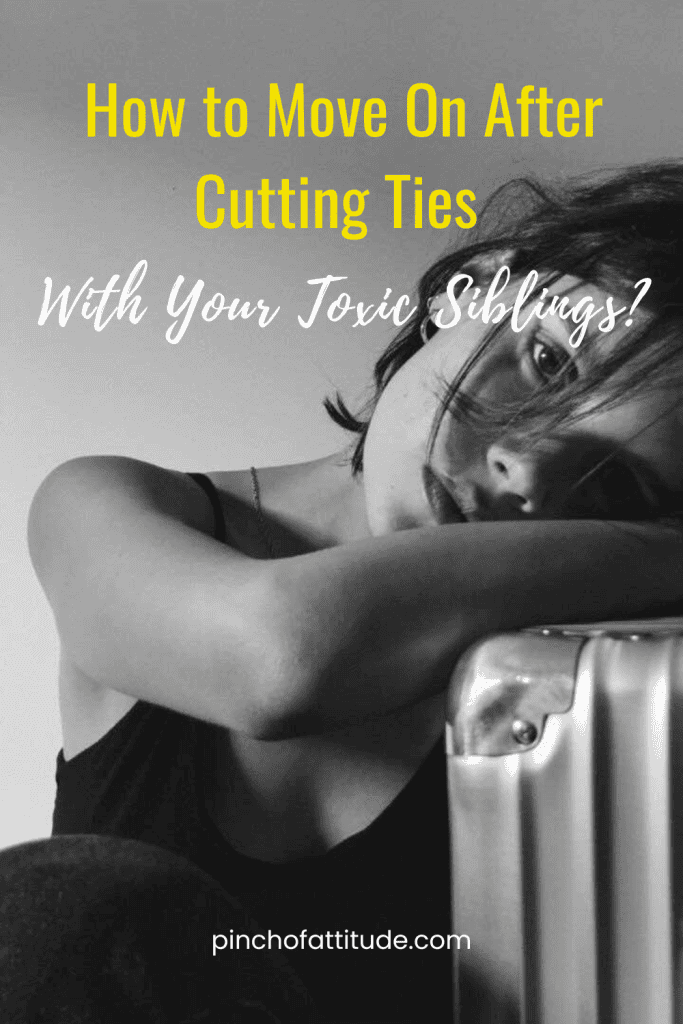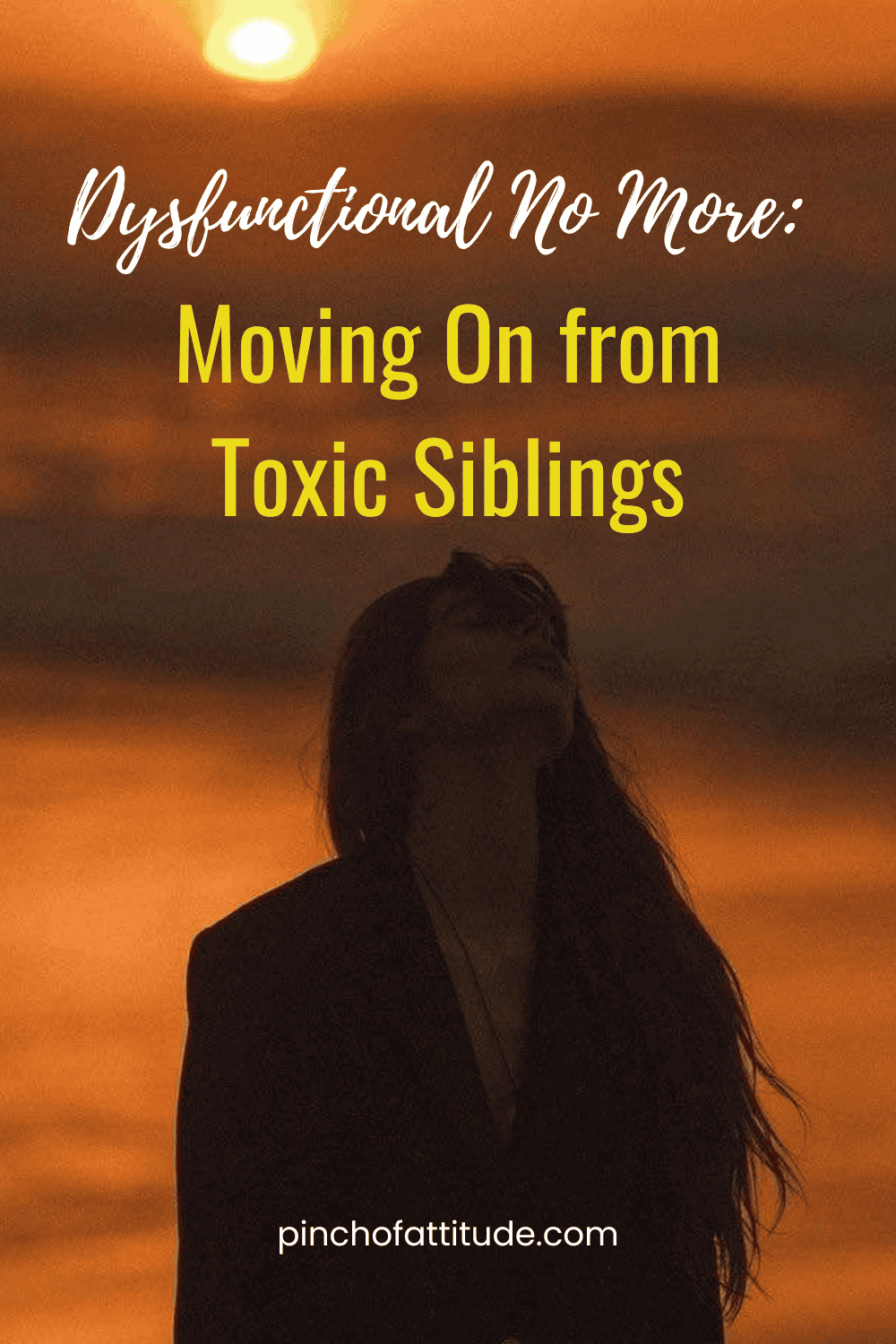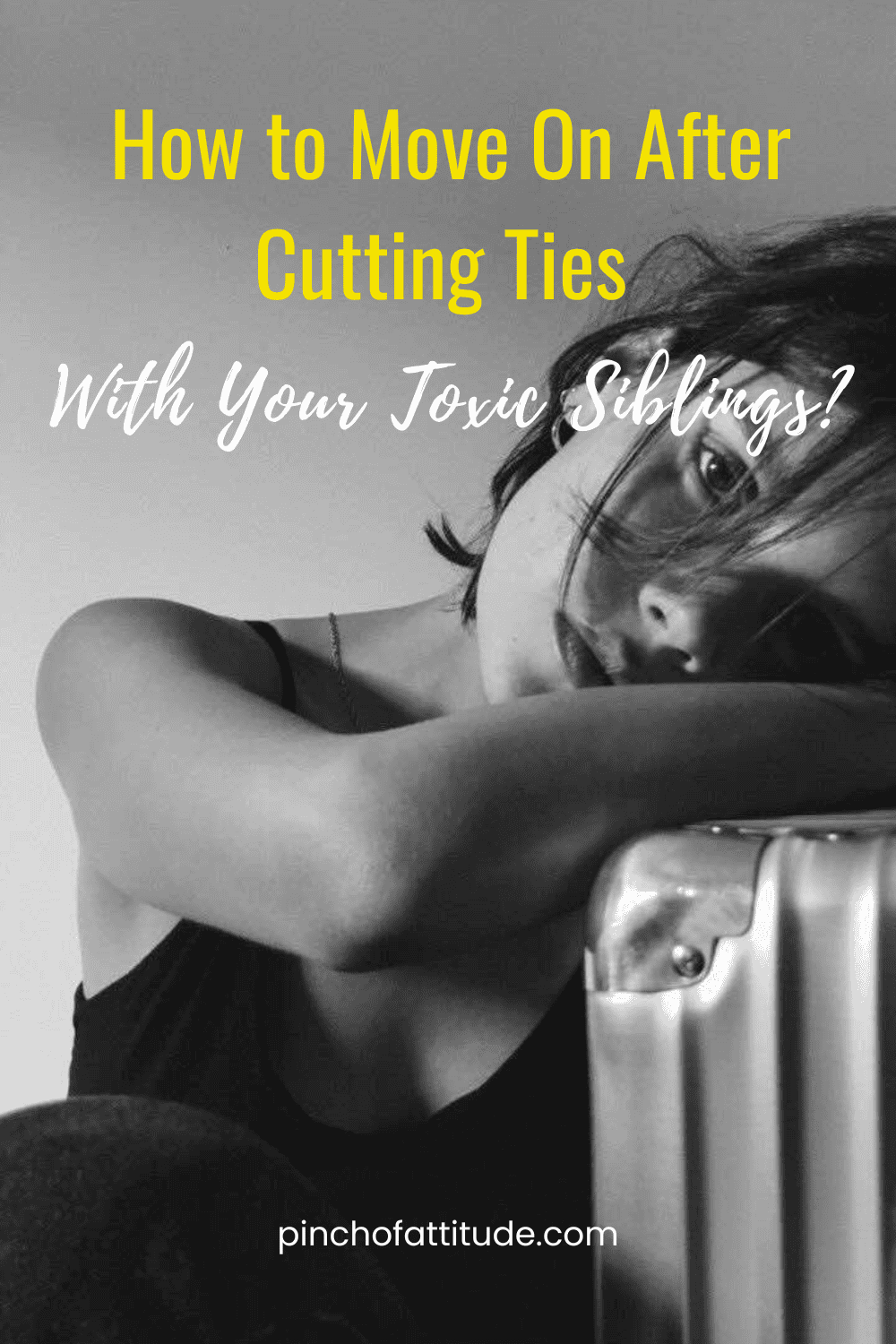Family dynamics can be crazy complicated, and deciding to put some distance between you and a sibling can really stir up a whole mix of feelings.
A few years back, I had to cut ties with my own siblings since our relationship had been really unhealthy. With my older sister, it was tough as nails, especially since we used to be super close, she was my best friend.
We had a lot of memories and shared experiences, so saying goodbye to that bond was seriously one of the hardest things I’ve ever had to do.
And even now, there are times when I really miss having her around despite how sour our relationship had turned towards the end.
The funny thing is, with my younger brother, it was a different story. We weren’t all that tight, so when I decided to step back from that relationship, it had zero effect on me.
Got me thinking, that maybe the stronger the bond with a sibling, the harder it is to let go and move on.
If you’re reading this and nodding along, just know you’re not alone.
Detangling yourself from toxic family ties can be an emotional rollercoaster, but it’s also a huge step toward reclaiming your peace and well-being.
Below, I’ll share some powerful strategies for moving on after cutting ties with your toxic siblings.
- You have the right to prioritize your mental and emotional well-being, even if it means reconsidering a toxic sibling relationship.
- Give yourself time and space to process your emotions without guilt or self-blame.
- After cutting ties with a toxic sibling, let go of guilt and redirect your energy toward healing and personal growth.
Table of Contents
Is It OK to Cut Off Toxic Siblings?

Yes and yes. If you’ve ever toyed with the idea of cutting ties with a toxic sibling, you’ve probably battled with a whole bunch of guilt, doubt, and uncertainty.
Family bonds are usually seen as sacred, so even thinking about breaking them can feel like breaking some unwritten rule.
But here’s the thing: toxic relationships, even if they’re with family, can seriously mess with your head and heart.
First off, you’ve got to realize that you have every right to prioritize your own well-being and happiness.
Just because someone shares your DNA doesn’t mean you have to endure their toxic behavior.
Family should be all about lifting you up, showering you with love, and helping you become your best self.
When a sibling keeps dragging you down with negativity, conflict, or pain, it’s acceptable to reconsider that bond.
Here are some of the things I would encourage you to consider when cutting ties with a toxic sibling:
- Your mental and emotional well-being should be at the top of your list. It’s totally okay to set boundaries or take a step back from someone who consistently puts your well-being at risk.
- Pay attention to the behavior your sibling shows. Is it a never-ending loop of manipulation, criticism, or disrespect? Have your efforts to address these issues hit a dead end or been brushed off? Chronic toxicity in a relationship usually points to deeper issues that might need serious changes to fix.
- Consider how your relationship with your toxic sibling spills over into other areas of your life. Is it straining ties with other family members or making it hard for you to form healthy connections elsewhere?
- Tune in to your instincts and how you’re feeling. If you find yourself constantly hurt, drained, or disrespected by your sibling’s actions, it’s totally valid to prioritize your emotional safety.
Deciding to cut ties with a sibling is a deeply personal decision and not one to take lightly.
Lean on friends, family, or a trusted therapist to gain some perspective and sort through your emotions.
How to Move On After Cutting Ties With Your Toxic Siblings
After what I’ve been through with my toxic siblings (the things I endured and all that stuff), I still found it hard to move on after cutting ties with them.
My older sister and I were once close after all. It wasn’t easy, but in these kinds of situations, all you can do is think of ways to move forward so you won’t get stuck.
That was what I did – and here are 11 things that worked for me that could also help you move on after saying goodbye to your toxic siblings:
1. Acknowledge Your Emotions
When you’ve made that tough decision to cut ties with a toxic sibling, it’s totally normal to ride a rollercoaster of emotions.
You might feel this deep sense of grief for the lost relationship or for what could have been. Anger might bubble up at the unfairness of it all or the pain you’ve been through.
You might even wrestle with guilt for setting boundaries or feel a wave of relief that you’re putting your well-being first.
The key here is to recognize and accept these emotions without being too hard on yourself. Just give yourself the space to feel whatever comes up.
Tip
Emotions are a natural reaction to messy situations, and letting yourself experience them can be a big part of the healing process.
2. Write Down All Your Emotions and Thoughts
Journaling can be a really powerful tool for sorting through all those complex emotions that pop up when you’ve cut ties with a toxic sibling.
When you grab that pen or start typing away, you’re creating this safe space to let it all out.
It helps you make sense of everything swirling around in your head and bring more understanding and clarity.
Try to make journaling a regular thing. Set aside some time every day or week to write. Start with simple prompts like:
- How am I feeling today?
- What emotions popped up during tough moments?
- What have I learned about myself through all of this?
3. Reflect on The Past and Understand Why Your Decision is Right
Taking a moment to look back at your relationship dynamics with your siblings can really help with healing and personal growth.
When you think about past interactions and behaviors, it can give you some important insights into why things got toxic.
As you dig into this reflection, go easy on yourself. It’s not about pointing fingers but more about getting why things went down the way they did.
Tip
Self-awareness is key for personal growth. Embrace this chance to learn from the past and make room for better, healthier relationships down the road.
4. Focus on Uplifting Yourself
Taking care of yourself is super important for keeping your head straight and your heart happy during this situation.
Make time for things that make you feel good, like music, exercise, good food, films, books – you know, your hobbies.
This is actually one of the things that helped me big time when I was in the process of moving on after cutting ties with my siblings. Engaging in hobbies can do wonders, honestly.
But, self-care is different for everyone, so try out different stuff until you find what clicks for you.
5. Read Self-Help Books
Diving into self-help books focused on healing from family drama or toxic relationships can be a game-changer on your road to feeling whole again.
These books dish out all kinds of insights, tips, and real-life stories that make you feel like, “Whoa, someone gets it!”
Reading about how others have powered through is a warm hug for your soul and makes you realize you’re not some lone ranger in this whole crazy journey.
It can also give you some fresh ideas and tools for tackling your own stuff.
6. Talk to Those You Trust, Don’t Hold Back Your Feelings

When you’ve made that tough call to cut ties with toxic siblings, having a backup is key.
It can be your ride-or-die friends, your family who’s got your back, or a therapist who’s there to lend an ear.
When I lost the good relationship with my sister, I also lost my rock. But I found a new one with the support system I built during the aftermath.
Tip
Opening up to these trusted souls about what you’ve been through can be like a breath of fresh air. They give you that boost you need to keep pushing forward and remind you that there’s a light at the end of the tunnel.
7. Let Go of Guilt
When you’ve decided to put some space between you and those toxic family members, kicking guilt to the curb is key.
If you think looking after your own mental health is selfish, you’re wrong. It’s straight-up necessary for keeping your head above water.
Don’t beat yourself up over it. You’ve got every right to shield yourself from anything that’s bringing you down, even if it’s coming from your own family so that you protect your well-being.
8. Practice Forgiveness (for Yourself)
When you’re trying to bounce back from a messy sibling situation, it’s important to cut yourself some slack.
Don’t let that guilt trip you up or hold onto any blame for stuff you think you messed up in that relationship.
We’re all human and we all mess up sometimes. You deserve to shake off that weight and chase after peace and happiness, no matter what went down in the past.
Give yourself a break from any calls you’ve made while dealing with all that craziness. You were just trying to handle a tough situation the best you could.
Tip
Once you stop carrying around that self-blame, you’ll find you’ve got room to heal and start walking forward with a bit more self-love and strength.
9. Focus on Your Future
Instead of getting stuck in what’s already happened, start focusing on what’s coming next.
Think about all the new things waiting for you – fresh experiences, new relationships, and opportunities that can really add some positivity to your life.
When you put your energy into the present and future, you give yourself the space to grow and thrive beyond all that negativity from before.
In my case, I’ve set personal goals so that I don’t become lost in life while moving on.
And guess what? It worked! I even kept succeeding in many aspects of my life like how I intended.
10. Redirect Your Energy
Put your energy into things that are going to fuel your growth and happiness.
Start by exploring ways to level up – learn new skills, chase after those career dreams, or dive into hobbies that really light you up inside.
When you pour your energy into positive things, it’s like planting seeds of purpose and strength.
Being proactive like this helps you carve out a life that’s all about positivity and resilience, leaving that toxic stuff in the dust.
11. Give Yourself Time to Get Over Things
Bouncing back from family drama, especially with toxic siblings, is no quick fix – it’s a journey that takes time and a whole lot of self-love.
Give yourself the space you need to work through those feelings and figure out how to move forward.
Know that healing doesn’t happen overnight and it looks different for everyone. Let yourself feel whatever you’re feeling without beating yourself up about it.
Trust that with time, things will start to make sense and feel better. Be kind to yourself during this transition phase because it’s totally okay to have days that are all over the place.
Through this, you’re giving yourself room to heal in your own way and come out stronger on the other side.
Related Posts:
Frequently Asked Questions
Is it acceptable to cut ties with a toxic sibling?
Yes, it’s important to prioritize your mental and emotional well-being. If a sibling consistently brings negativity or harm into your life, you have every right to consider distancing yourself.
How can I know if cutting ties is the right choice?
Pay attention to your feelings and instincts. If you feel consistently hurt, drained, or disrespected by your sibling’s behavior, it’s valid to prioritize your emotional safety and well-being.
What should I do after deciding to cut ties with a toxic sibling?
Focus on self-care and seek support from friends, family, or a therapist. Acknowledge and accept your emotions, and give yourself time to heal from the situation.
How can journaling help after cutting ties with a toxic sibling?
Journaling provides a safe outlet to process complex emotions. It helps bring clarity and understanding to your feelings during this challenging time.
Is it normal to feel guilty after cutting ties with a toxic sibling?
Yes, it’s common to struggle with guilt, but remember, prioritizing your well-being isn’t selfish. Shielding yourself from harmful relationships, even with family, is crucial for your mental health.





It’s my youngest daughter that’s a narcissist and married to one! She has never let me see my granddaughters and blocked me after she got married!